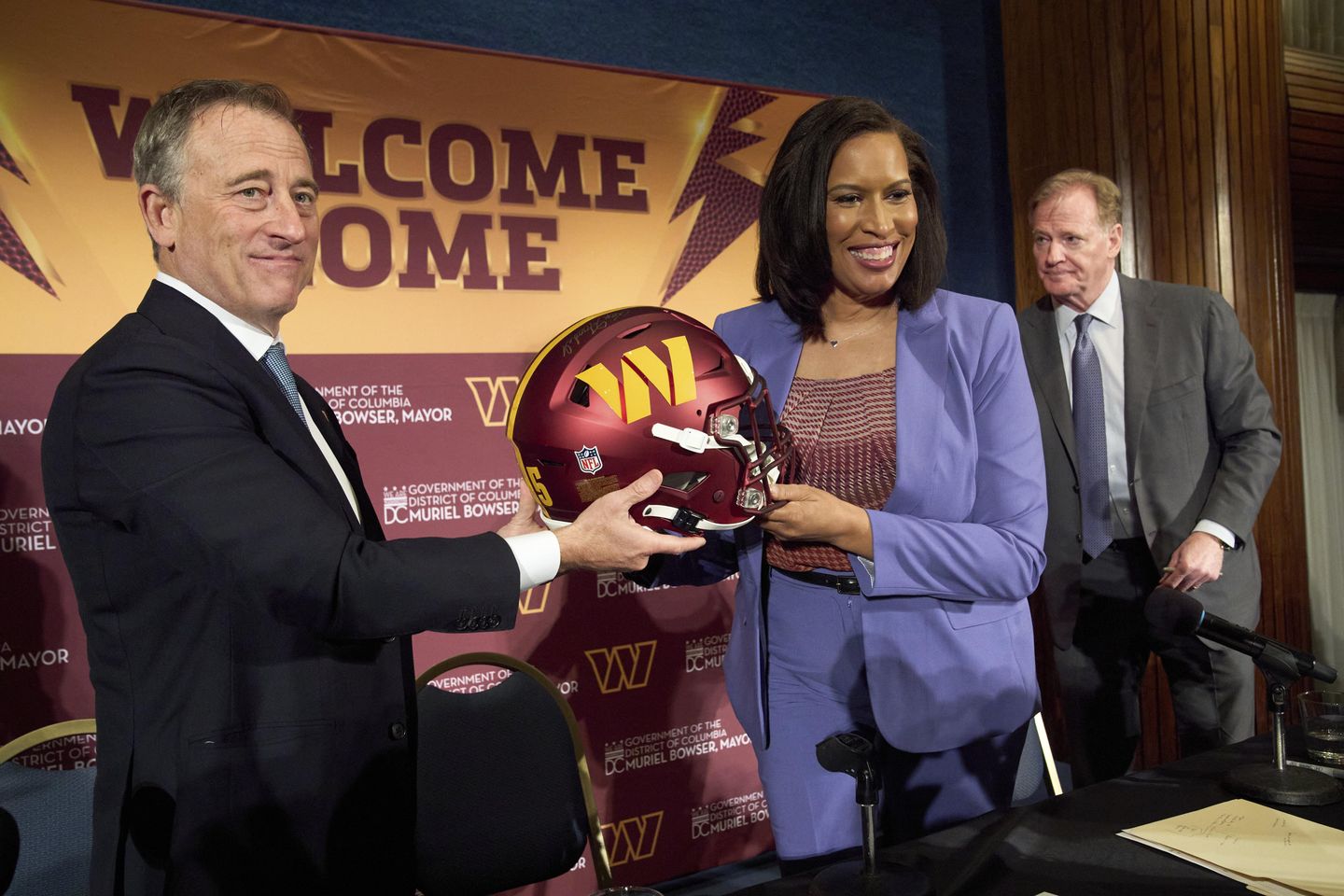
The $1 billion in public funds attached to a new stadium at the RFK Stadium site worries detractors like D.C. Council Chairman Phil Mendelson, as does the $1 per year rent payment that the Washington Commanders would pay.
“My initial sense is that the deal is very, very, very favorable to the Commanders,” Mr. Mendelson said last week. “It’s nice to be supportive of the Commanders, but this is a taxpayer expense.”
Without lawmakers like Mr. Mendelson on board, the fate of the NFL franchise’s move back to the District remains up in the air.
D.C. Mayor Muriel Bowser and the Commanders have said they are negotiating with apprehensive council members ahead of a July 15 deadline for legislators to vote.
Mr. Mendelson and other critics have expressed concerns about the amount of public funding and associated tax breaks for the NFL franchise’s return to the District. Ms. Bowser insists that the deal — which features $2.7 billion from the Commanders to construct the stadium and about $1.1 billion in public funds for supporting infrastructure — is vital for the city.
The standoff has spread throughout the city council, with an almost even split of supporters, critics and uncommitted representatives. The proposal needs seven supporters by July 15, a deadline set by Ms. Bowser and the Commanders in a term sheet. The mayor’s office and the Commanders could mutually agree to shift the deadline, though.
Four D.C. Council members have thrown their support behind the proposal thus far, with three vocal detractors and five undecided lawmakers.
Concerns from council members and residents around the stadium have centered around a lack of communication from the mayor’s office and the allocation of public money.
Zachary Parker, Ward 5 council member, has opted to host community listening sessions.
Representatives from the mayor’s office and the Commanders will attend the event at Two Rivers PCS on Wednesday to hand out free yard signs to supporters and provide details about the plan.
Mr. Parker has not said whether he would vote in favor of the current proposal, but described it as “an exciting time” when announcing the community information event.
However, Mr. Mendelson said the council has the same amount of information as the general public.
In a press briefing last week, the chairman said he can’t request specific changes to a deal that he hasn’t been able to fully study.
During the planning for Nationals Park and Audi Field, the city council had several months to analyze the proposal and offer suggestions. Mr. Mendelson claimed that those reviews have saved the city more than $10 million in the long run.
“There will be lots of work for the council to do as we look at this,” he said. “If the past is prologue, then I suspect that we will make the deal even better for taxpayers to the tune of millions, maybe tens of millions, of dollars.”
But that’s a future step.
D.C. Council is still waiting on a budget proposal from the mayor’s office. The federal government’s continuing resolution, which slashed more than $1 billion from the city budget, has delayed that process.
The mayor’s office is expected to file a budget on Thursday.
“We have to see what is not getting funded, what is being pushed aside or delayed,” Mr. Mendelson said. “It is not clear to me, based on what we’ve received to date, what additional benefits there are for the Commanders.”
The initial proposal, according to Mr. Mendelson, is overly slanted in favor of the Commanders.
The franchise would be paying $1 per year in rent, a far cry from the $6 million that the Nationals pay each year to lease the city’s ballpark. Mr. Mendelson and other detractors said they’re also concerned about parking plans.
The city would be responsible for building at least two garages to support 8,000 parking spaces for the 65,000-capacity stadium. But the Commanders would be exempt from parking taxes.
“It’s very, very, very generous,” Mr. Mendelson said. “The $856 million [from the city] is the second-highest public subsidy for a stadium in the country.”
The $856 million price tag is the upfront “cash” cost, he noted. The total investment grows to $1.1 billion over time.
The term sheet allows for some adjustments to the deal, so long as they are “mutually agreed upon,” according to Ms. Bowser.
One Commanders representative said the franchise is eager to listen to council members and work with them to strike a deal.
However, any material changes to the proposal could end the exclusive negotiations that the Commanders agreed to with the mayor’s office. That could allow Maryland officials to swoop in with a deal to keep the franchise at its current site in Landover.
“This is delicate, so it’s not easy to come in and say, ‘Change this, change that,” Ms. Bowser said on “The Politics Hour with Kojo Nnamdi.”
Mr. Mendelson noted that he believes some kind of deal will move forward. He isn’t convinced about the economic value of an NFL stadium, but didn’t dispute that the Commanders would accelerate development on the long-neglected RFK Stadium site.
“I don’t think he wants it to be his legacy that he blocked $2.7 billion of investment, brought the team home,” Ms. Bowser said of Mr. Mendelson. “But more than that, this is what they’re all going to have to think about. In five years, you don’t want to be standing there with empty, crumbling parking lots instead of vibrant neighborhoods. That’s what would happen.”
The RFK Stadium site has been scarcely used since the Commanders left in 1996. The arena was occasionally used by the Nationals and D.C. United, but it has fallen into disrepair in recent years.
The piecemeal deconstruction of the rusting structure is ongoing.
The Commanders have said they want to break ground on a new stadium in 2026 with plans to play their first home game at a shiny, state-of-the-art, roofed home in 2030.












